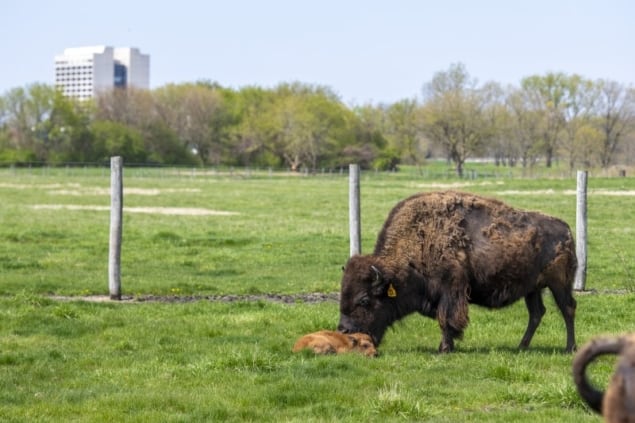
Located on prairie land near Batavia, Illinois, the Fermi National Accelerator Laboratory has long been renowned as a place that’s friendly to users and visitors alike. It has welcomed not just visiting scientists and contractors but friends and relatives of employees and members of the local community too. Once inside, they could attend lectures, visit experiments, or drive or cycle around the lab’s 27 km2 grounds to watch its herd of bison or fish in its ponds.
But not anymore. To gain access, adult visitors to the campus, including scientists, must now present a certain type of driving licence or similar identification document approved by the US Department of Homeland Security. Once there, they are restricted to specific buildings and areas of the site. The restrictions have led to lab retirees and delivery people being denied entry to the campus, while some visiting scientists have had to give invited lectures via Zoom from local hotel rooms. Even Fermilab’s employees cannot enter certain labs.
“It became clear that the COVID-19 restrictions weren’t being rolled back,†says Fermilab postdoc Fernanda Psihas, who decided to take action. Working with Rob Fine, a former Fermilab postdoc now at Los Alamos, and Jason Vasel, a US Air Force contractor who had seven years connected with Fermilab, they have set up a “Reopen Fermilab†petition. Warning of “the consequences of these restrictions on the local community and scientific processâ€, it has so far been signed by over 2600 scientists and community members. The petition asks for the new access policies to be overturned, saying they harm Fermilab’s reputation and threaten its science and education programmes.
Maintaining openness
Fermilab officials see the issue as more complicated than reversing restrictions introduced because of the COVID-19 pandemic. Not only is the lab undergoing a transformation that includes the construction of the Deep Underground Neutrino Experiment but the Department of Energy (DOE) has recently tightened safety regulations for its 17 national laboratories. “Fermilab has always been an open and welcome institution,†lab director Lia Merminga told Physics World. “We’re striving to maintain the openness while complying with the new DOE regulations.â€
Merminga, who joined Fermilab as director in April last year, notes that the public can still walk in, bike, watch the bison, and even come to the auditorium for Saturday morning lectures. But she concedes that Fermilab did not do “a good enough job†of communicating and applying the new rules.

Lia Merminga: directing the future of Fermilab
“We’re also working very hard to streamline the process for implementing the new regulations, “ she adds. “The way we did it was not the best way.†Merminga notes that the DOE has provided $13m to allow the public to access areas of the campus, including the cafeteria, by end of this year. “We’re working to open the 15th floor [of the main building], from which on a clear day you can see Lake Michigan,†says Merminga. “And we’re building a new access center that will be completed late next year or early in 2025.â€
Meanwhile, Reopen Fermilab plans to hand-deliver copies of its petition with signatures to Illinois’ Senators and Representatives at the end of the month. Yet according to Merminga, the petition has already had an impact. “Did the petition stimulate [better] communication? I would say yes,†she told Physics World. “The letter was an impetus for us for introspection, and to realize that we needed to communicate more simply and clearly and frequently.â€


